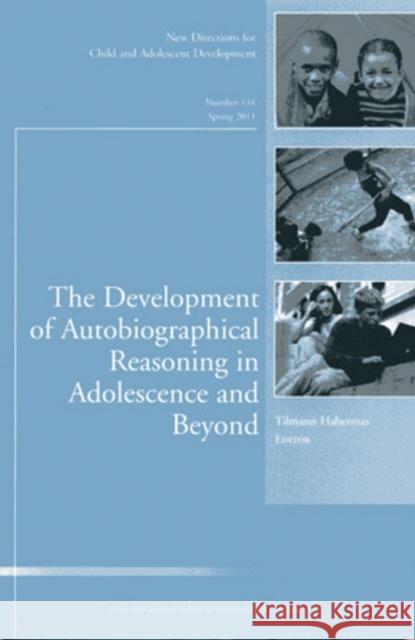The Development of Autobiographical Reasoning in Adolescence and Beyond: New Directions for Child and Adolescent Development, Number 131 » książka
The Development of Autobiographical Reasoning in Adolescence and Beyond: New Directions for Child and Adolescent Development, Number 131
ISBN-13: 9781118003800 / Angielski / Miękka / 2011 / 112 str.
The Development of Autobiographical Reasoning in Adolescence and Beyond: New Directions for Child and Adolescent Development, Number 131
ISBN-13: 9781118003800 / Angielski / Miękka / 2011 / 112 str.
(netto: 107,97 VAT: 5%)
Najniższa cena z 30 dni: 111,98
ok. 30 dni roboczych.
Darmowa dostawa!
Young people's development of autobiographical reasoning represents the evolution of a biographical perspective that frames their individuality in terms of their specific developmental histories. Autobiographical reasoning relies on autobiographical memory, but goes beyond it by enhancing understanding through the active creation of coherence between events and the self. It has been studied in relation to numerous topics, including coping with life events, rumination, life review, narrative identity, and the development of the life story. This volume contextualizes autobiographical reasoning in normative ideas about the life course or life script (Bohn), and in the cultural practice of reading fiction and poems (Mar, Peskin, & Fong). Autobiographical reasoning develops in adolescence, building on cognitive and narrative skills acquired in childhood. Although autobiographical reasoning is a cognitiive activity, it is often an integral part of narrating life experiences to significant others. Autobiographical reason is studies as a means for creating self-continuity. (Fivush, Bohanek, & Zaman), and to process one's own and parents' life experiences (McKeough & Malcolm). Althought autobiographical reasoning is an important ability in our culture, its contribution to an individual's adaptation depends on contexts and personality, as well as on the quality of the reasoning process. (McLean & Mansfield). This is the 131st volume of the Jossey-Bass quarterly report series New Directions for Child and Adolescent Development, . The mission of New Directions for Child and Adolescent Development is to provide scientific and scholarly presentations on cutting edge issues and concepts in the field of child and adolescent development. Each volume focuses on a specific -new direction- or research topic, and is edited by an expert or experts on that topic.











